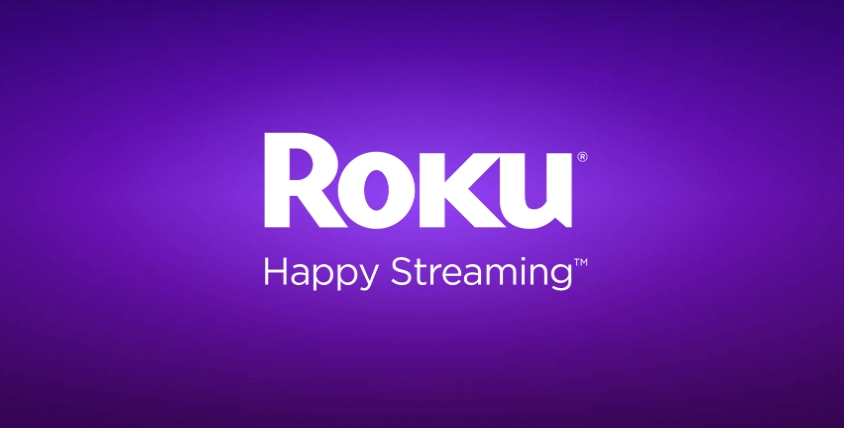OpenAI's Dev Day 2025: How ChatGPT's App Ecosystem Is Redefining the Internet
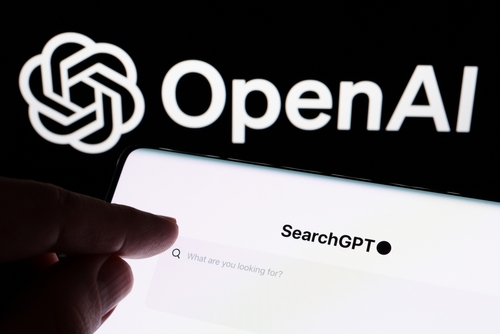
Two years ago, OpenAI's first Dev Day felt like a startup showing off its breakthrough product. ChatGPT had 100 million weekly users and processed 300 million API tokens per minute—numbers that made headlines and seemed impossibly large. Fast-forward to today, and those figures look almost modest. ChatGPT now serves over 800 million people every week while crunching through 6 billion tokens per minute, powered by 4 million developers who've built their businesses on OpenAI's platform. That's 8 times more users and 20 times more processing power than just two years ago.

Source: OpenAI
New Products and Functions: An AI-Powered App Ecosystem
At the heart of OpenAI’s Dev Day 2025 was the launch of a comprehensive suite of developer tools transforming ChatGPT from a conversational AI into a unified app ecosystem. The centerpiece was the launch of the App SDK, which allows developers to build fully interactive applications running inside ChatGPT itself. This SDK leverages the Model Compatibility Protocol (MCP), a standard many know but which OpenAI has perfected by deeply integrating it with ChatGPT. Basically, MCP is an open standard that acts like a universal plug-and-play interface, allowing AI models such as ChatGPT to seamlessly connect and communicate with various external data sources, tools, and applications without needing custom integrations for each connection. Apps built with this SDK empowers developers to build fully interactive applications within ChatGPT, offering experiences that extend beyond text to include embedded videos, dynamic maps, and interactive visuals.
For example, integration with Zillow’s data now works directly inside ChatGPT, letting users search homes without leaving the platform. This represents a major shift where ChatGPT acts like a new kind of app store, becoming the primary gateway for users to a wide variety of services in one-stop fashion.
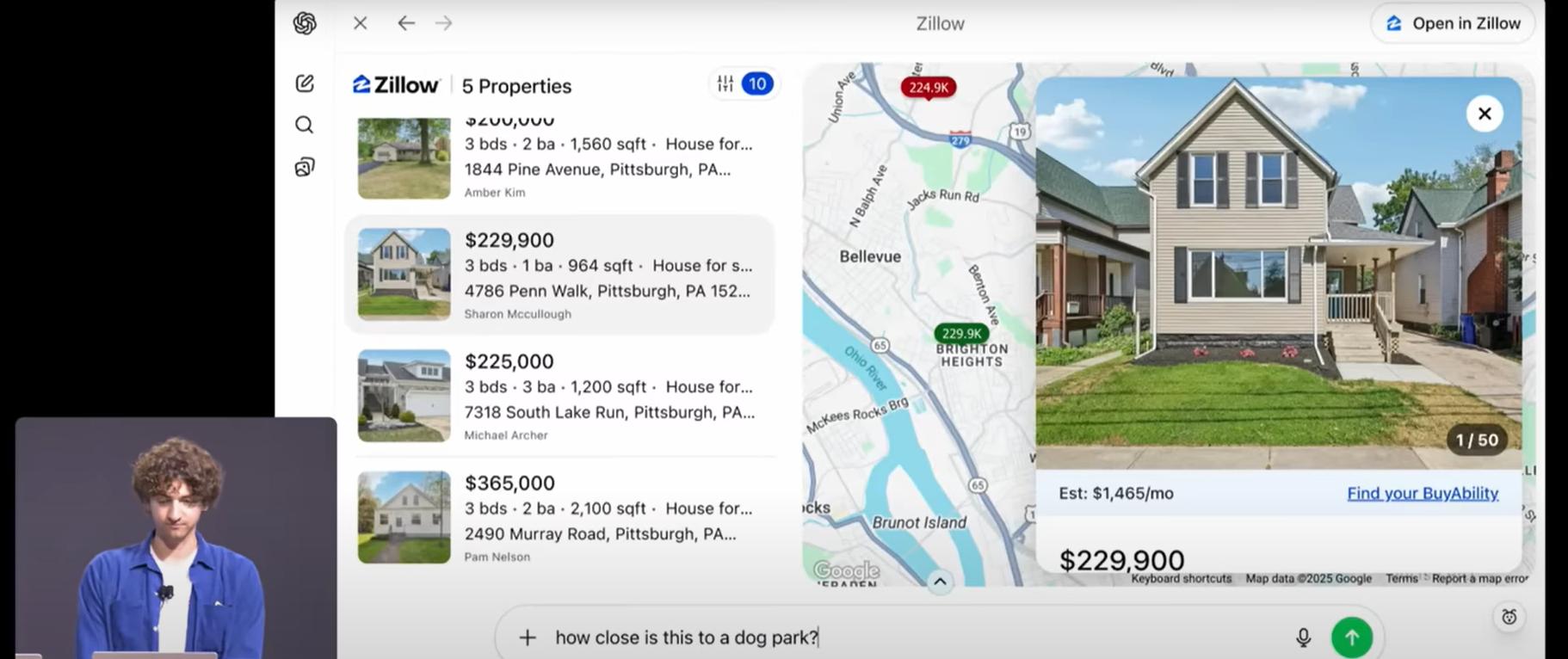
Source: OpenAI
Complementing the App SDK is AgentKit, a holistic platform for building AI agents faster and more reliably. At the core of AgentKit is the AgentBuilder, a powerful no-code/low-code visual tool that lets developers drag and drop modular components to design, test, and deploy complex multi-step AI workflows. Agents built here can connect securely with internal tools through a central registry, and are enhanced with safety guardrails that ensure controlled and dependable operations, all without heavy coding.
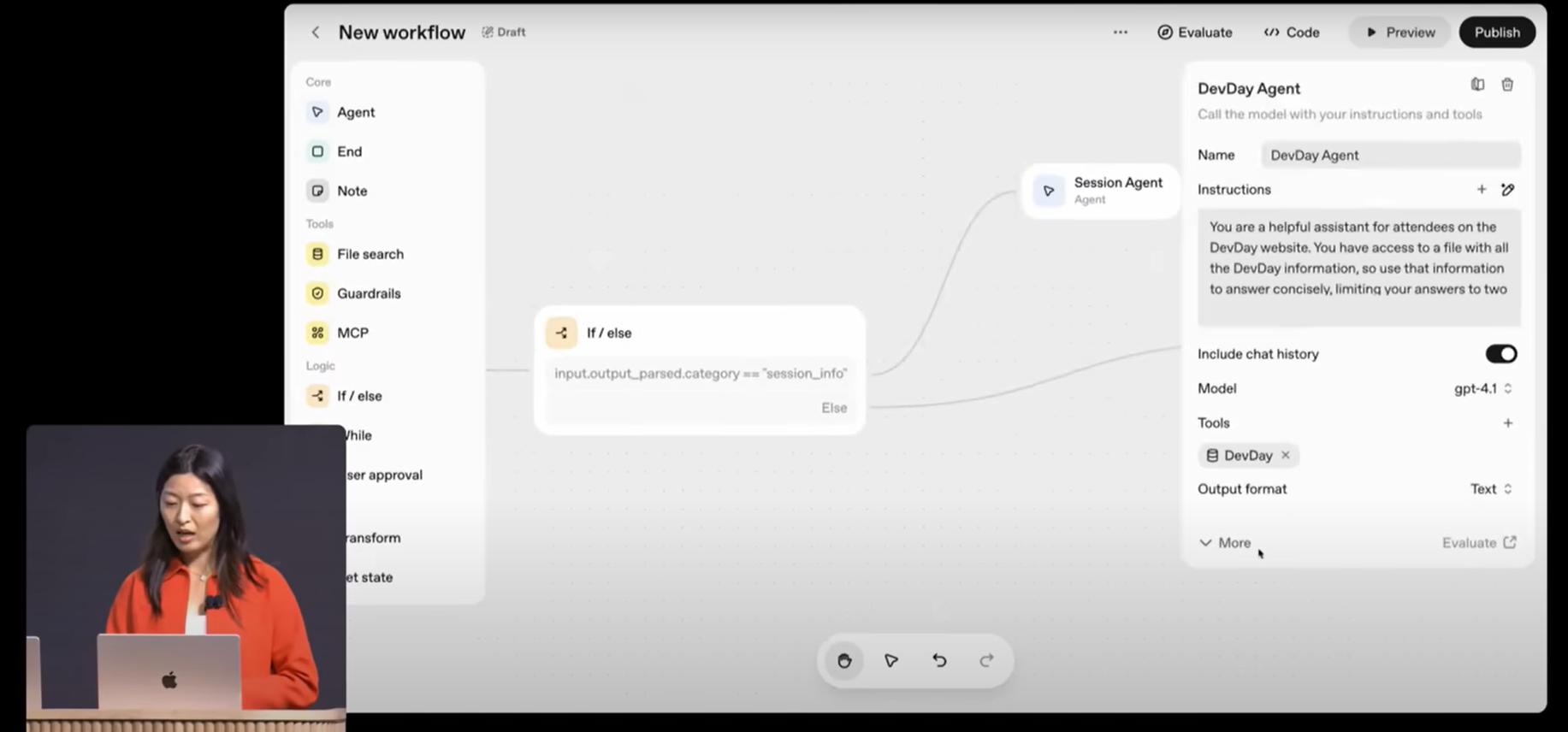
Source: OpenAI
AgentKit also includes ChatKit. It is a ready-to-use, embeddable chat interface that developers can easily drop into any app or website they build to create AI-powered conversational experiences; it handles complex chat features like streaming responses, message threading, and interactive widgets, allowing the chat to blend seamlessly with the app’s own look and feel while making the AI interaction natural and engaging.
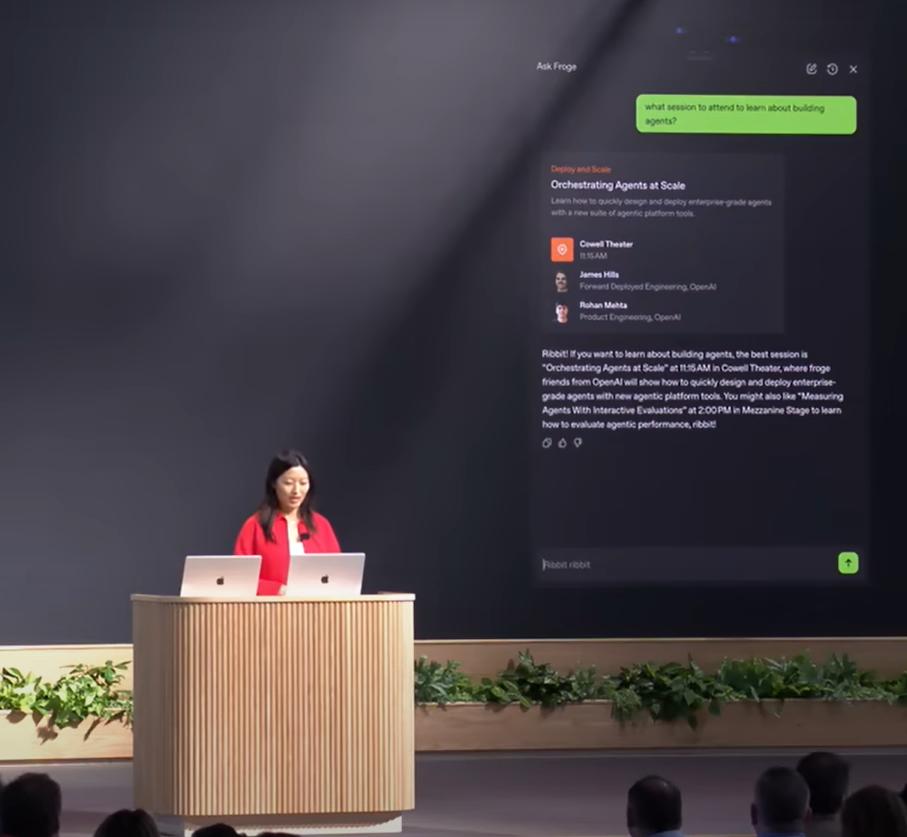
Source: OpenAI
Finally, the event showcased the latest in coding AI, GPT5-Codex, an evolved software engineering assistant that now powers Slack integrations, team SDKs, and offers deep development analytics. Codex continues to enhance developer productivity, enabling rapid code creation, refactoring, and review, with adoption accelerating across startups and enterprises.
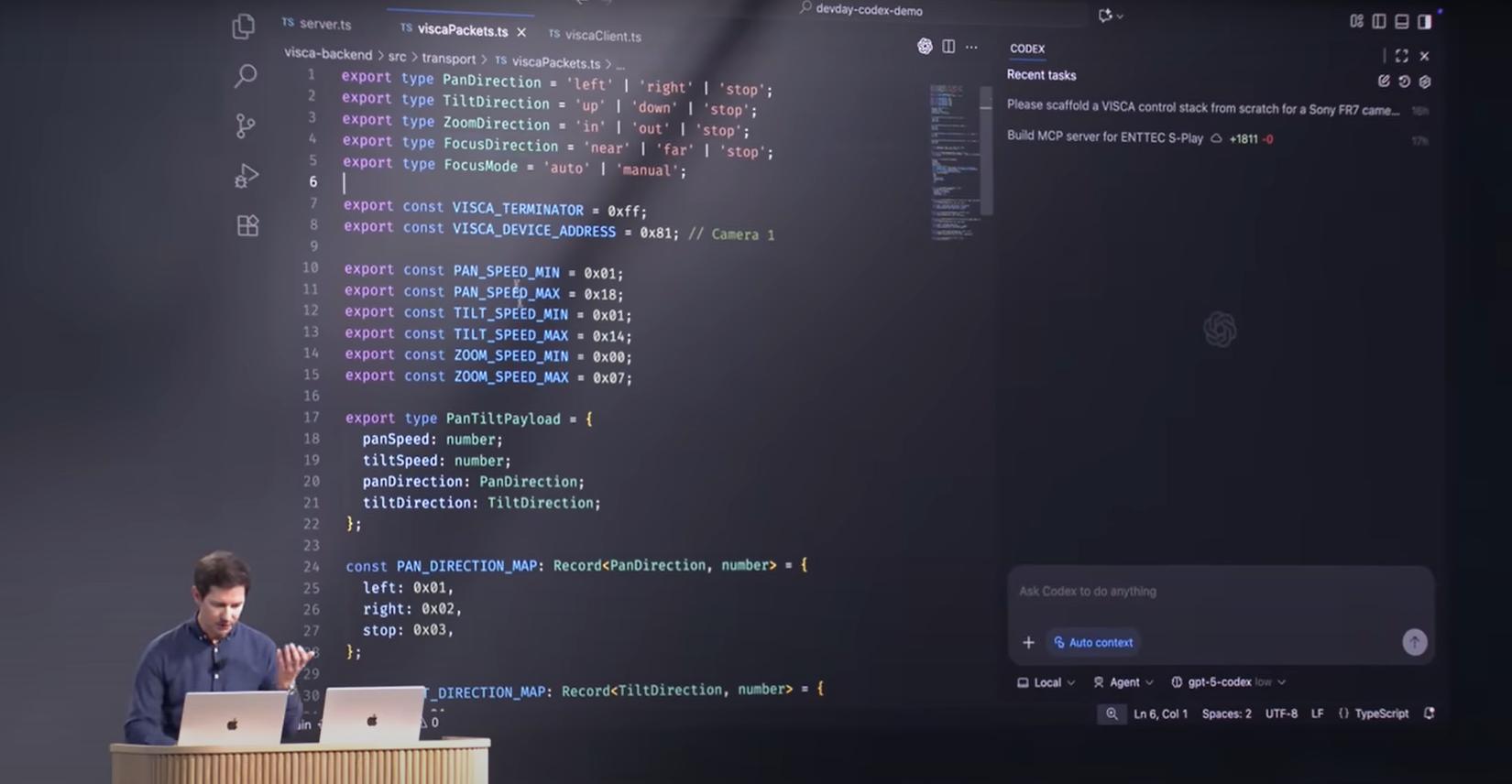
Source: OpenAI
Building the Bridge: How AI Tools Become User Experiences
These powerful developer tools are only as valuable as the experiences they create for end users. The journey from OpenAI's new developer toolkit to practical user applications follows a streamlined path designed to minimize friction and maximize impact.
Developers begin by accessing the App SDK preview or AgentKit's visual workflow builder to craft applications or intelligent agents through minimal coding. The processes are designed for rapid backend integration and building rich, interactive frontends. Built-in testing and safety guardrails help ensure that apps and agents are reliable and safe before release.
Once published, these apps and agents become discoverable inside ChatGPT conversations, reaching hundreds of millions of users worldwide. ChatGPT intelligently surfaces these tools contextually, creating a seamless ecosystem where users can accomplish complex tasks through natural conversation rather than app-switching. The platform learns user preferences and workflow patterns, proactively suggesting relevant tools before users even realize they need them.
The Great Disruption: OpenAI's Challenge to the Software World
OpenAI's transformation into an AI-powered app platform marks a fundamental shift in how software is accessed and consumed. By offering vertical-specific services, from real estate to education to graphic design, through a single interface, this evolution drastically lowers friction for users and redirects traffic that previously flowed through standalone native apps or SaaS portals.

Source: OpenAI
The immediate disruption is visible across consumer-facing sectors. OpenAI's partnership strategy demonstrates how it's harnessing existing players' data and services through MCP, creating a new distribution paradigm. Companies like Zillow, Coursera, and Canva now reach users directly through ChatGPT conversations, fundamentally altering digital engagement patterns. While partners may retain control of some core functionalities inside their native apps, the bulk of user interaction is migrating within ChatGPT's interface, a critical shift that redistributes both user attention and potential revenue streams.
For traditional SaaS companies, the implications extend far beyond current partnerships. While today's ChatGPT integrations don't directly threaten enterprise software like Salesforce or Workday, OpenAI's platform creates the foundation for AI-native competitors to emerge across multiple software categories. The threat isn't just theoretical. As AI capabilities advance, businesses may prefer conversational interfaces that understand natural language over complex software dashboards requiring extensive training.
The monetization potential signals an even more transformative future. OpenAI has laid the groundwork for in-chat commerce protocols and instant checkout capabilities. When these features roll out, likely throughout 2026, they could fundamentally reshape digital commerce by enabling transaction processing, contextual advertising, and direct revenue capture within conversational interfaces. This evolution would position ChatGPT as a comprehensive digital commerce platform, moving far beyond today's subscription-based AI model.
Navigating the Headwinds: Enterprise Adoption Challenges
However, this transformation isn't without significant obstacles that could determine the pace and extent of OpenAI's market penetration. Data sharing agreements with partners will define how deeply apps can integrate inside ChatGPT versus features reserved for native apps, raising questions about the openness and competitive fairness of this emerging ecosystem. Partners must balance the benefits of ChatGPT's massive user base against potentially ceding control over customer relationships and data insights.
Security and privacy concerns remain critical barriers, especially for enterprises requiring local or on-premise deployments. Since ChatGPT cannot yet be deployed at scale inside corporate firewalls, many businesses face compliance risks and data sovereignty concerns that could limit adoption. How OpenAI addresses these enterprise requirements, potentially through dedicated cloud instances or hybrid deployment models, will significantly influence large-scale corporate adoption.
Conclusion
OpenAI Dev Day 2025 marked an ambitious attempt to turn ChatGPT into the digital equivalent of Windows or iOS. By letting developers build apps inside ChatGPT and attracting major partners to redirect user traffic through its platform, OpenAI is making a bold play to become the gateway to the internet.
The investment implications cut both ways. OpenAI's partners could win big by tapping into 800 million weekly ChatGPT users, while traditional software companies face pressure to adapt to conversational interfaces or risk losing users to AI-powered alternatives. The companies that recognize this platform shift early will position themselves advantageously, regardless of which AI company ultimately succeeds.
The real battle, however, is just beginning. Google's Gemini has the advantage of integration with Android and Google's vast ecosystem, while competitors like Anthropic's Claude and Elon Musk's xAI could develop their own platform strategies. OpenAI's first-mover advantage in app ecosystems is significant, but not insurmountable. The winner will likely be determined by execution speed, developer adoption, and which platform delivers the most seamless user experience—not just the best AI model.



